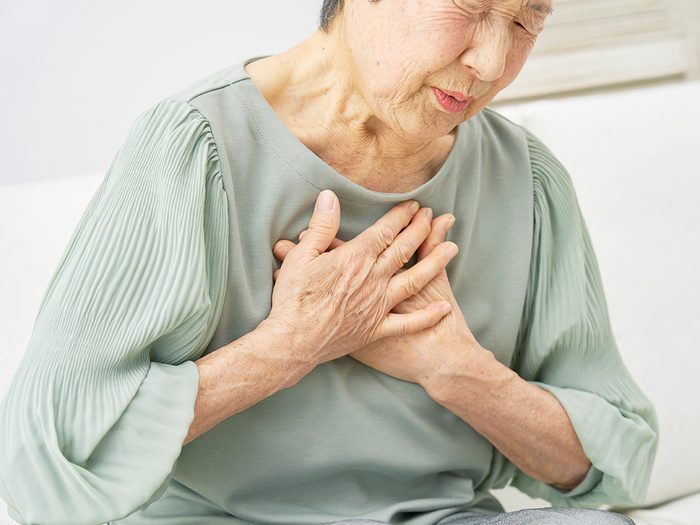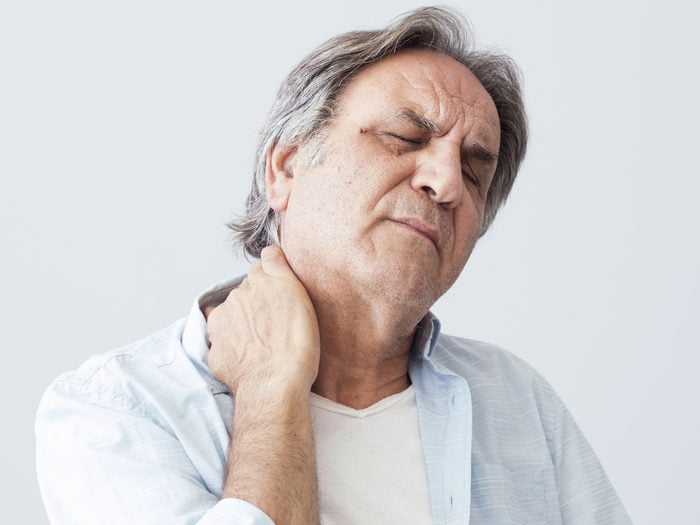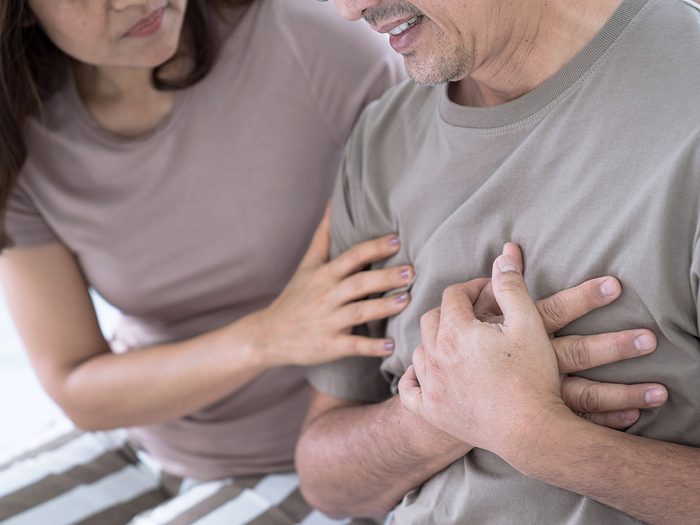
“This isn’t what we expected”
One night in September 2015, Karen Narraway of Pickering, Ontario, couldn’t get comfortable at bedtime. Her heart felt like it was racing. A registered nurse, she checked her own pulse and discovered that it was high. She also noticed an unusual ache travelling down her left arm. Narraway, 52 at the time, was a single mom with two teens. Her job, though she loved it, was non-stop. “I thought maybe I was just stressed,” she recalls.
Over the next couple of weeks, she tried yoga and relaxation breathing. But when the symptoms didn’t go away, she saw a cardiologist. Her heart rate shot even higher after only eight minutes on a treadmill, but on her electrocardiogram (ECG), her heart appeared to be functioning normally.
Narraway’s father had had his first heart attack before he was 50. But Narraway, who was slim, ate a healthy diet and didn’t smoke, accepted the cardiologist’s explanation that the high pulse was likely from anxiety. “I wasn’t feeling like I was having anxiety, but it was a relief to have an answer,” she says.
A beta blocker helped normalize her heart rate. The arm pain was blamed on arthritis. And when, a few months later, Narraway started feeling chest discomfort, she was sent home from the ER—doctors again citing anxiety.
In early 2017, when Narraway realized that her chest pain worsened with brisk walking, her sister pushed her to go back for another assessment. “Everything changed after that,” she says. An angiogram found six major blockages that had previously been missed. (ECGs only catch problems 60 to 70 percent of the time, especially in early disease.) While the specialist was performing the X-ray of the vessels around Narraway’s heart, he leaned down and said: “I’m so sorry, but this isn’t what we expected to find.”
“It sent chills through me,” says Narraway. A few days later, she underwent quadruple bypass surgery. Without it, a sudden massive heart attack could have claimed her life.

The diagnostic challenges
Each year, over 63,000 Canadians have a heart attack. They typically occur because a blood vessel to the heart is blocked—cholesterol plaque builds up on the vessel walls or a large blood clot creates a plug. When that happens, timing is critical.
“The earlier the symptoms are recognized, the better your outcome,” says Dr. Shamir Mehta, director of interventional cardiology at Hamilton Health Sciences in Ontario. According to Brock University’s Heart Innovation Research Program, over 90 percent of people who have heart attacks had warning signs in the days, weeks or months beforehand.
But heart attack symptoms can be subtle and confounding, which is why the Brock research team has developed the Prodromal Symptoms Screening Scale, a free, web-based questionnaire to help people identify them.
Furthermore, according to recent research led by the Yale School of Public Health, which examined gender differences in almost 3,000 people who were hospitalized with heart attacks, women tend to have more varied symptoms than men—not only chest pain but also things like nausea or jaw discomfort. It could be one reason why women are misdiagnosed much more often; in a joint U.K.-Swedish study in 2016, the rate was 50 percent higher.
“Women and men also communicate differently,” points out Dr. Sharon Mulvagh, co-director of the Women’s Heart Health Clinic in Halifax. “Men often answer in a sentence or two.” Women, on the other hand, may give more detailed descriptions of what they’re feeling, which health-care providers can misinterpret as anxiety.
Women themselves are also almost twice as likely as men to believe their symptoms are due to stress, according to the Yale study. And they may delay attending to them, putting their own needs on the back burner.
“If you feel like something is off and you’re not your normal self, you should seek medical help,” says Cindy Yip of Heart and Stroke. “Listen to your body, because chances are the signs are there, and you can act on them quickly.”
Here are 11 heart attack symptoms you shouldn’t ignore.

Heart Attack Symptoms You Shouldn’t Ignore
Chest discomfort
This symptom, called angina, is caused when your heart is deprived of blood because a coronary artery is clogged. It might come and go with exertion and rest. It’s not usually described as sharp pain—more of a tightness, pressure or heaviness.
One long-standing myth about female heart attacks is that they don’t typically come with chest pain. Researchers now know that some degree of chest discomfort is experienced by 90 percent of men and women having heart attacks. The Harvard School of Public Health showed that although men are more likely to call it “chest pain” and women are more apt to use words like “discomfort” or “pressing,” the sensations they’re feeling are similar.
People with diabetes, on the other hand, who may have nerve damage, are less likely to feel chest pain with a heart attack. “Sometimes all they have is a sense of feeling unwell and having to lie down—but it’s their heart,” says Mehta.
Here are more facts about heart disease women should know.

Arm pain
Discomfort in the arm, especially in the left arm, is another common heart attack symptom. This is referred pain from the chest area, says Mulvagh: “Pain fibres are very primitive; the signals can be transmitted to other areas of the body.” It’s usually described as a dull ache in the arm, not a shooting pain, as you might have with a pinched nerve, for example. The arm might feel heavy, and the fingers may tingle.
Did you know heart attacks spike on a certain day of the week?

Upper body pain
Referred heart attack pain can also sometimes be felt in other parts of the upper body—the neck, radiating across the shoulders or in the upper back. Some people even feel discomfort in the jaw or throat, often just on the left side. Like angina, it may worsen when they’re active and go away when they’re at rest. “Often these patients are investigated by ear, nose and throat doctors and other specialists,” says Mehta. “In fact, this is the way the brain is perceiving that the heart is not getting enough blood.”
Having trouble making yourself heard? Here’s expert advice on how to communicate effectively with your doctor.

Indigestion
Heart attack symptoms are sometimes described as a burning feeling in the abdomen, which is often assumed to be indigestion. “Young people in particular will confuse it with gastroesophageal reflux and will take antacids to try to settle it down,” says Mehta. Pain can also be felt in the upper abdomen; he’s seen heart attack patients come into the ER complaining of a stomach ache.
Find out the worst foods for your heart.

Sweating
Heavy perspiration, clamminess or a cold sweat is a common symptom of a heart attack, says Dr. Rob Grierson, medical director of the Winnipeg Fire Paramedic Service: “If you’re having some sort of discomfort and think it’s heartburn or a pulled muscle, and then all of a sudden, for no reason, you become sweaty, that’s a real red flag.”
The sweating, which is triggered by the sympathetic nervous system, can be profuse and isn’t linked to any physical exertion.
Here are 20 more symptoms you should never ignore.

Shortness of breath
If your heart is having difficulty delivering oxygen, it can cause breathlessness, especially when you’re physically active. It’s more likely to be a sign of heart trouble if it’s unusual for you, says Yip: “If you can normally run 10 kilometres without shortness of breath, and all of a sudden you can’t run five, that’s different from someone who doesn’t ever run.”
Discover 50 heart health tips cardiologists want you to know.

Fatigue
We all feel tired from time to time if we’re sleep deprived or overworked. But the fatigue linked to a heart attack tends to consume you. “People with this symptom say it’s an overwhelming fatigue or weakness that comes out of the blue,” says Grierson. Exhaustion is less likely to be caused by a heart attack if it’s not accompanied by any other symptoms, like shortness of breath.
But if you’re tiring too easily during exertion—in one survey, some patients said that in the weeks prior to their heart attack, they couldn’t even make a bed without feeling exhausted—it could be one of the earliest signs of trouble.
Check out more signs your fatigue is something more serious.

Nausea and vomiting
Many people are surprised to learn that a heart attack can make you feel sick to your stomach. Some people throw up constantly while they’re having a heart attack. But, says Grierson, it’s another one of those symptoms that can be confused with other causes: “You could have someone with the flu coming into the ER feeling crummy and nauseated.” In many cases, a physician can only tell the difference with testing, so it’s important to push for an assessment.

Anxiety
Fear, panic or a sense of impending doom can actually be a symptom of a heart attack. You’re likely subconsciously sensing changes inside your body, as the sympathetic nervous system is activated and things like blood pressure and heart rate are affected. A real panic attack usually passes in about 20 minutes, says Mulvagh. “With a heart attack, that impending-doom sensation sticks around.”
Find out how to improve your heart health in six easy steps.

Light-headedness
If your blood vessels dilate in response to a heart problem, it can cause your blood pressure to drop. Similarly, if a damaged heart is having difficulty pumping blood, you may have decreased oxygen to your brain. It’s unlikely that your only symptom of a heart attack is dizziness or light-headedness, but this could be part of the bigger picture. When Heart and Stroke reported in 2018 that 78 percent of women didn’t recognize early subtle symptoms of an impending heart attack, dizziness was among them.
These are the best foods for your heart.

Heart palpitations
Most of the time, there’s nothing to be concerned about if you feel your heart occasionally skipping a beat, as long as you’re not having other heart attack symptoms. “If it’s dangerous, generally the person’s going to have some other symptoms,” says Grierson. Also, when heart palpitations are linked to a heart attack, they tend to be ongoing.
Your pulse could also feel like it’s racing. A resting heart rate (RHR) is considered to be normal if it’s between 60 and 100, depending on the individual. (Factors like extreme emotions, hot temperatures and athletic fitness can affect the rate.) But a 2019 paper in Open Heart reported that in middle-aged men, an RHR of 75 or more indicated a greater risk of heart disease. Narraway’s RHR was over 110 when she first noticed it. “My heart was just pounding,” she recalls.
Since her quadruple bypass surgery, Narraway has developed additional blockages in vessels too small to fix with another procedure. She takes medications to slow her heart disease but wishes she had started treatment earlier. “I was angry that it took so long for the pieces to be put together,” she says. “I might have had a different outcome if it had been caught. Maybe I could have had stents put in, started lifestyle changes and medication earlier and not had the same extent of damage.”
Narraway has advice for people having unusual symptoms: “Trust yourself and your body—be persistent and find somebody who will help you.”
Now that you know the heart attack symptoms to watch out for, find out how it’s actually possible to reverse heart disease.